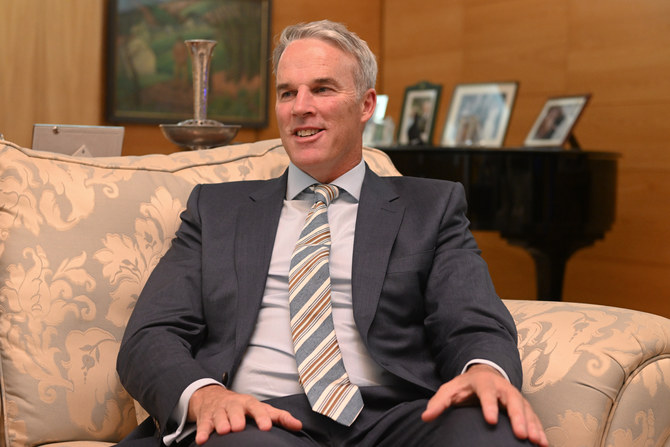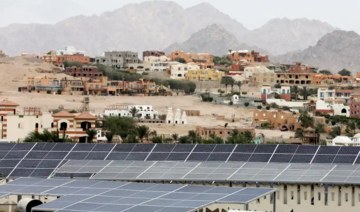RIYADH: Renowned endurance swimmer and the UN Environment Programme’s Patron of the Oceans Lewis Pugh has issued a clarion call: It’s time for urgent climate action to save coral reefs to support life on earth.
Pugh, an ocean advocate and a pioneer swimmer who has been a leading figure in efforts to protect the oceans, participated in a talk hosted by the British Embassy in Riyadh on saving coral reefs.
In an exclusive interview with Arab News, the UN patron shared his purpose for his Saudi Arabia visit: “It’s to start talking about the UN Climate Change Conference (COP27), which is happening in Sharm El-Sheikh, which is in the Red Sea. And the situation for coral reefs is very, very serious. The science is, if we heat the planet by 1.5 degrees (Celsius), 70 percent of coral reefs die. If we heat the planet by two degrees, 99 percent of coral reefs die. We are now on track for at least 2.3 to 2.4 degrees. We are on track to lose all the coral in my lifetime.”
Pugh said that coral reefs are essential for life on Earth and that about one-quarter of life in oceans lives in coral reefs: “They are the nurseries of our oceans, and they are absolutely essential for these countries like Saudi Arabia, Egypt, Sudan. This is something so precious, we cannot afford to lose these coral reefs.”
“I am here to say to everybody in Saudi Arabia that every fraction of a degree now matters,” said Pugh.
Pugh, who is the first person to complete a long-distance swim in every ocean of the world, was asked if he is going to swim into the Red Sea in the Kingdom: “Yes, I have to make an announcement very soon. I have always wanted to do a very big swim in the Red Sea, and hope to make an announcement next week.”
Praising Saudi Arabia for its green initiative and commitment to advancing the fight against climate change, Pugh underlined: “Saudi Arabia has obviously got a very important role to play. They are a G20 nation, and they have the funds now necessary to invest in new technologies and transition as we have to do this really quickly to transition from fossil fuels into renewables. I think they can play such an important role in leading the world into a sustainable future.”
On his visit in a time of transformation in various fields in line with Saudi Vision 2030, the oceans advocate said: “Well, I am very excited to be here. This is my first time in Saudi Arabia. It’s my first time going down to Neom this weekend to see that part of the country. I am really excited. A lot of my friends have dived there. And they said to me that this is one of the most incredible places to dive in our world.”
“When we think of the Red Sea in the West, we think of Egypt. But the Red Sea forms the Jordanian border all the way down to Yemen. It’s about 2,200 km, Saudi Arabia owns over half of the Red Sea, and it has, obviously, a duty and a responsibility to protect this. This is one of the great natural wonders of the world,” he said.
“Just like we say to the Brazilians, you have got the majority of the Amazon, and you must protect that for all mankind. A message to Saudi Arabia, you have something which is precious to the whole world. Let’s work together to protect this natural wonder of the world,” added the UN Patron of the Oceans.
The Saudi Swimming Federation aims to promote water sports among Saudi youth, when asked if he is open to cooperation with the federation, the endurance swimmer told Arab News: “I am here just for a few days, I never ever come to a country just once. COP27 is happening now in Sharm El-Sheikh. COP28 is going to be in Dubai. Saudi Arabia is the meat in the middle of the sandwich. I will be coming back here, for a couple of years now, talking about this transition which we have to make to a sustainable future. I do it through sport. Sport carries a message. So I would love to swim with Saudi swimmers.”
Pugh has highlighted the melting of the Arctic sea ice, the melting glaciers in the Himalayas, and the impact the reduced water supply will have on world peace, and has a message for the Saudi youth: “I tried to do a very simple swim. So it carries a message. Each swim must have a purpose; each swim must highlight a specific part of the world, and why it's important to protect it. And then afterward, I go in and meet the politicians and the business leaders and the communities in that area to try and get them protected.”
He added: “Over a period of 35 years, my team and I have done something in some incredible places. But the vast majority of the swims have been in the polar regions, in the Arctic and the Antarctic, that’s where we are seeing the huge change, we are seeing the melting of the ice. And as I mentioned, we see coral and ice as the two ground zeros of the climate crisis. This is where we see the change taking place. So I want to do more swims over coral reefs. And not just being a voice for the polar regions, but also for coral reefs, and all the magnificent wildlife that lives in.”
He concluded his comments by saying that every generation has an opportunity to change the world, to make it more sustainable and just: “We have got to be that generation.”
To save the seas, the UN Patron of the Oceans said that we need to be protecting at least 30 percent of the world’s oceans now by 2030, and the best way to do that is to create these big marine-protected areas like national parks but in the sea.
He also said that the world has to reduce carbon emissions dramatically and that people must become educated: “What I mean by that is we (have) got to become environmentally literate. We (have) got to understand the impact which we are having on the planet. It’s more than awareness.”
















